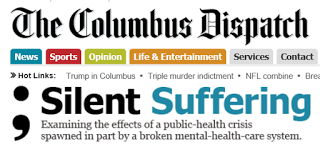Series on suicide as a public-health issue in Ohio is one of five finalists for national journalism ethics award

A newspaper series on suicide as a public issue in Ohio is among the five finalists for the Anthony Shadid Award for Journalism Ethics, which is given for aggressive reporting on important issues with care for the consequences of that reporting.
Reporters from The Columbus Dispatch dealt with privacy and public-safety issues issues in reporting on suicides as a public-health issue while considering the probability that reporting on suicides might lead to copycat attempts. The title of the series, “Silent Suffering,” reflected the taboo that still attaches to suicide and discourages reporting about it, as noted here in January.
“The Dispatch spent nine months examining the effects of a public-health crisis spawned in part by a broken mental-health-care system,” the paper says in a headnote for the series. One story was headlined “Most people who commit suicide have mental illness, don’t receive care needed.”
Other finalists are a McClatchy Newspapers team that preserved medical privacy of victims of nuclear-energy programs; ProPublica and NPR, which protected the privacy and dignity of sick and injured employees in revealing how states are curtailing workers’ compensation programs; Milwaukee Journal Sentinel reporter Gina Barton, who faced ethical challenges reopening a 40-year-old unsolved murder; and a team from The Associated Press that protected its sources from retaliation, including death, in reporting on the use of slave labor in supplying fish to the U.S.
The award is named for the late Anthony Shadid, a Pulitzer Prize-winning foreign correspondent for The New York Times and The Washington Post and a journalism graduate of the University of Wisconsin. The university’s Center for Journalism Ethics oversees the award and will present it at its annual conference April 29.
